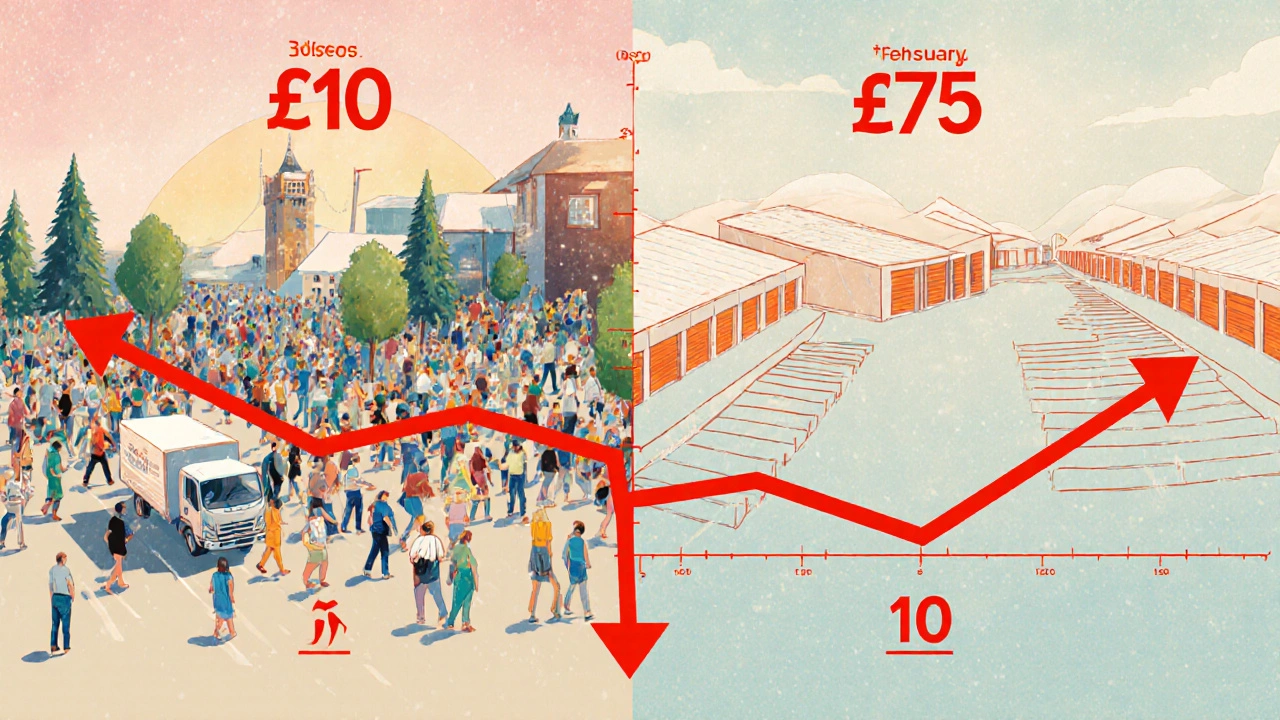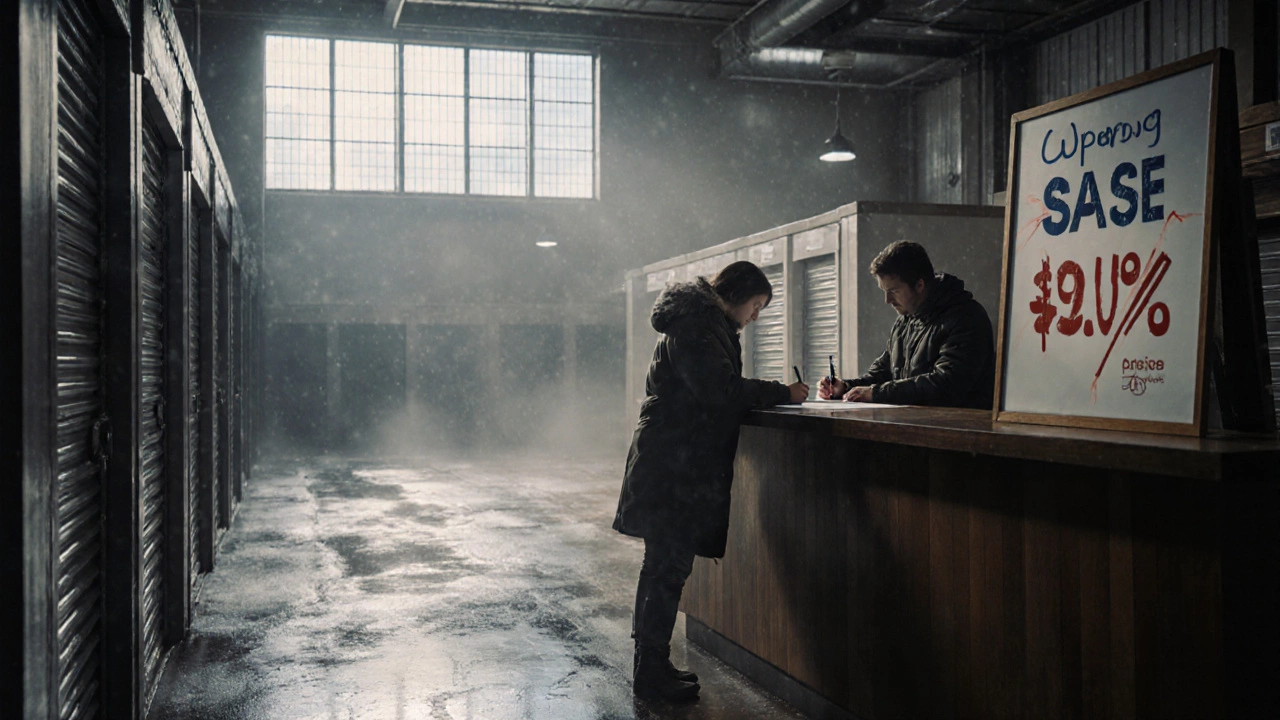Storage Unit Savings Calculator
Find Your Best Storage Deal
Calculate potential savings by selecting your unit size, time of year, and lease length
Results will appear here after calculation
If you’re thinking about renting a storage unit, you’re probably hoping to save money. And you’re right to look for a deal - storage prices can vary by hundreds of pounds depending on when you sign up. The truth? Storage units aren’t always expensive. In fact, there are specific months when prices drop hard, and knowing when to act can save you serious cash.
Storage units are cheapest in late winter and early spring
The best time to find the lowest rates on storage units is between January and March. After the New Year, demand plummets. Most people moved during the summer or over the holidays, and by February, they’ve settled in. Landlords are sitting on empty units and need to fill them fast. That’s when discounts kick in.
In Oxford, a standard 5x5 unit that normally costs £65 a month might drop to £45 in February. A larger 10x10 unit, usually £110, can drop to £75. These aren’t rare deals - they’re standard across most major chains like Public Storage, Extra Space, and local operators. Why? Because storage facilities have high fixed costs. Empty units mean lost income. They’d rather rent at a discount than sit idle.
Why summer is the worst time to rent
Don’t rent between May and August. That’s peak moving season. Families relocate for school, students leave dorms, and people downsize after house sales. Demand spikes. Supply doesn’t. Prices go up - sometimes by 30% or more.
One landlord in Headington told me he raised rates by £20 a month in June last year. He didn’t lose a single tenant. People were desperate. If you’re moving in July, you’re paying a premium. And you’re not getting a better unit - just paying more for the same space.
Look for move-in specials - they’re everywhere
Most storage companies run promotions to attract new tenants. These aren’t hidden. They’re advertised on their websites, in local Facebook groups, and sometimes even on billboards. But here’s the trick: don’t take the first deal you see.
Call three different facilities in your area. Ask: “Do you have any move-in specials this week?” Then ask: “If I sign for six months, can you beat that rate?” Many will drop the price further to lock you in. Some offer:
- First month free
- 50% off the first three months
- Free truck rental with your lease
- Free climate control for the first month
One woman in Summertown saved £180 last March by signing up for a 10x10 unit with a “first three months at £50 each” deal. That’s £150 off the regular price. She didn’t even have to haggle - the manager offered it first.

Climate-controlled units drop in price too
You might think climate control adds a premium - and it does, usually £15-£30 extra per month. But even those units get cheaper in the off-season. In January, you can find climate-controlled units at rates close to standard ones. That’s rare.
Why? Because people assume climate control is only for valuable items like electronics or antiques. But in Oxford’s damp winters, even clothes, books, and furniture can mildew. If you’re storing anything sensitive, a climate-controlled unit in February might cost less than a regular unit in June.
Long-term leases often mean bigger discounts
Most facilities give better rates if you commit for six or twelve months. A 12-month lease can knock 10-20% off the monthly rate. It’s not always advertised. You have to ask.
One storage facility in Cowley offers a 15% discount on all 12-month leases signed before March 1. That’s £10 off a £70 unit - £120 saved over the year. Even if you think you might move in six months, lock in the long-term rate. Most places let you cancel with 30 days’ notice. You’re not stuck.
Weekdays beat weekends
It sounds small, but timing your visit matters. If you show up on a Saturday afternoon, you’re competing with families who moved last weekend. Staff are tired. Managers are busy. They’re less likely to negotiate.
Go on a Tuesday or Wednesday morning. Staff are fresh. They’ve had time to review occupancy reports. They know which units are empty. And they’re more willing to give you a better deal to close the deal quickly.

Check for corporate or military discounts
Many storage companies offer discounts for:
- Active or retired military personnel
- Teachers
- NHS staff
- Employees of large companies (like Oxford University or local hospitals)
These aren’t always listed online. Call and ask: “Do you have any group or professional discounts?” One nurse in Headington got 10% off her unit just by mentioning her NHS ID. No paperwork. No proof needed - just a verbal confirmation.
What to avoid
Don’t fall for these traps:
- Hidden fees - Some places charge for locks, insurance, or administrative fees. Ask for the total monthly cost before signing.
- Auto-renewal traps - Your rate might jump after the first month. Make sure you know when and how much it increases.
- “Guaranteed lowest price” claims - These are marketing fluff. Always compare multiple locations.
One man in Summertown signed a deal in April for £80/month. Three weeks later, he saw the same unit advertised for £65. He called back, showed the ad, and got the lower rate. He didn’t complain - he just asked. And they gave it to him.
Bottom line: Plan ahead, call around, and act in winter
Storage units aren’t a one-price market. They’re a dynamic system driven by supply, season, and competition. The cheapest time to rent is between January and March. The worst is June through August. Use that knowledge.
Call at least three places. Ask for move-in specials. Negotiate. Sign a long-term lease if you can. Avoid weekend visits. Check for professional discounts. And always read the fine print.
With a little timing and a few phone calls, you can rent a storage unit for half the price most people pay. That’s not luck. That’s strategy.
Are storage units cheaper in winter?
Yes, storage units are typically cheapest between January and March. After the holiday moving season ends, demand drops, and facilities offer discounts to fill empty units. You can often find deals like first month free or 50% off the first few months during this time.
Is it cheaper to rent a storage unit for 6 months or 12 months?
Longer leases usually mean lower monthly rates. A 12-month lease often comes with a 10-20% discount compared to a month-to-month rental. Even if you’re unsure how long you’ll need the unit, locking in a long-term rate can save you money - most facilities allow cancellation with 30 days’ notice.
Do storage units offer discounts for NHS staff or teachers?
Many storage companies offer discounts for NHS staff, teachers, military personnel, and other professionals. These aren’t always advertised online, so it’s worth asking directly. A simple phone call confirming your status can get you 5-15% off your monthly rate.
Should I rent a climate-controlled storage unit?
If you’re storing items sensitive to humidity or temperature - like wood furniture, electronics, documents, or clothing - then yes. Even in winter, Oxford’s damp weather can cause mold and mildew. Climate-controlled units are often cheaper in January and February, making it a smart time to lock one in.
What’s the best day of the week to visit a storage facility?
Visit on a weekday morning - Tuesday or Wednesday is ideal. Staff are less busy, more likely to negotiate, and have up-to-date info on available units. Avoid weekends, especially Saturday afternoons, when demand is highest and managers are overwhelmed.
Can I negotiate the price of a storage unit?
Absolutely. Storage is a competitive market. If you’ve found a unit you like, call other nearby facilities and ask for their best rate. Then tell the first one: “I’ve got a better offer. Can you match it?” Most will lower the price to keep your business.
If you’re planning to store anything this year, don’t wait until summer. Start looking in January. Call around. Ask for discounts. And lock in your unit before the rush hits. You’ll thank yourself later.
